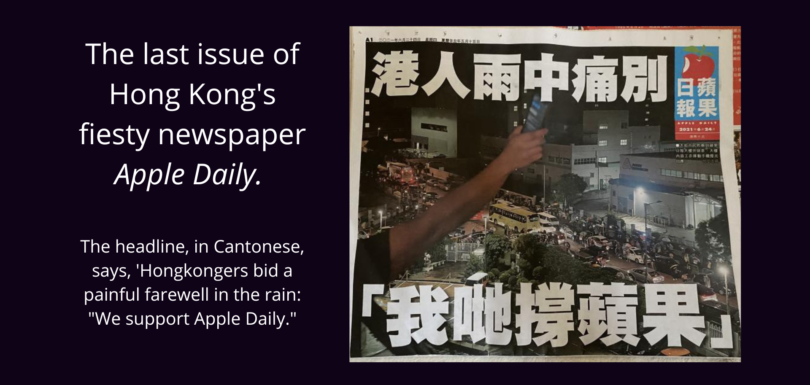HONG KONG — It was a year ago when Beijing’s tightening grip on press freedom in Hong Kong forced the closure of the pro-democracy newspaper Apple Daily.
Founded by Jimmy Lai in 1995, Apple Daily had more than 3.8 million registered web users, nearly half of Hong Kong’s population. What made Apple Daily standout among other newspapers was not only its valor in the face of political censorship, but also its sensational style of reporting that was revolutionary to the traditional newspaper industry in the late ‘90s and early 2000s.
But all of this came to an end on June 24, 2021, when the Hong Kong government froze the cash flow of its mother company, Next Digital. On the same day, five executives and editors were arrested on charges of collusion with foreign powers under the National Security Law.

At this point, the 73-year-old Lai had already been behind bars for two months for unauthorized assembly in the 2019 protests, with another 12 months of service left. In December of the same year, he was sentenced to another 13 months in jail for participating in the Tiananmen massacre vigil, an annual assembly in remembrance of the students killed in the 1989 Beijing crackdown.
Despite its popularity, Apply Daily faced criticism even among its pro-democracy supporters. Its biased reporting and overt support for democratic political ideals undoubtedly went against the protocol for journalism objectivity. However, many Hongkongers – including me – saw the value of Apple Daily not in its reporting, but in its defiant spirit in speaking against the government.
Apple Daily was a symbol of freedom of expression and more importantly, freedom of the press. It was a uniting symbol among protesters — the daily prints of Apple Daily seemed to be a silver lining amid the Anti-Extradition Law Amendment Bill Movement in 2019 and 2020.
Lai’s resilience has also made him a figurehead in Hong Kong’s fight for democracy.
But all that is a thing of the past.
Following the crackdown on Apple Daily last year, two other pro-democracy newspapers closed down as Hongkongers stepped into 2022. Happy New Year.

Seen as the last hopes for independent journalism and press freedom in Hong Kong, Stand News and Citizen News were forced to close on criminal charges of “conspiring to publish seditious material.”
To the average Hong Kong teenager, the closure of Apple Daily may just mean some fewer posts in their Instagram feed, but to me as an aspiring journalist, it symbolizes an end to my dream.
The media crackdown and the end of press freedom in Hong Kong implied that I could no longer pursue my passion in my homeland without the risk of persecution.
As the gatekeeper of information and the fourth estate of the government, the press takes up the key role to ensure the government’s public accountability and transparency to its citizens.
The suppression of press freedom is the first step to the doom of democracy.
Joanne Yau is a Junior Reporter with Youth Journalism International.



